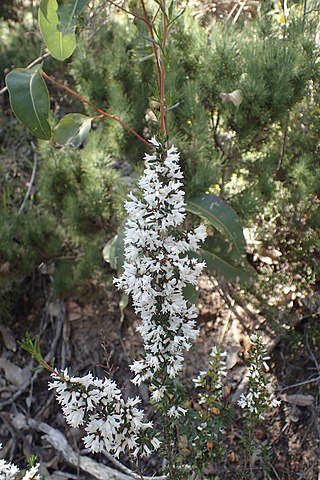
Cryptandra arbutiflora, commonly known as waxy cryptandra, is a species of flowering plant in the family Rhamnaceae and is endemic to the southwest of Western Australia. It is a shrub with spiny branches, elliptic to linear leaves and tube-shaped white flowers.

Cryptandra amara, commonly known as bitter cryptandra or pretty pearlflower, is a species of flowering plant in the family Rhamnaceae and is endemic to eastern Australia. It is a densely-branched shrub with clustered, more or less linear to egg-shaped or elliptic leaves, and tube-shaped white flowers arranged on the ends of branchlets.
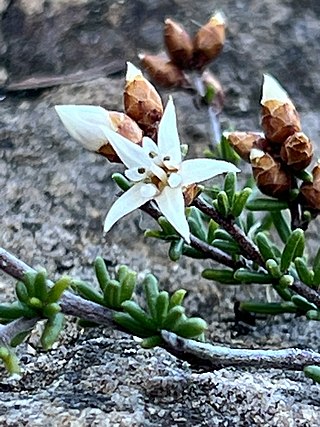
Cryptandra aridicola is a flowering plant in the family Rhamnaceae and is endemic to inland areas of Western Australia. It is a small, spreading shrub with white or pink flowers.
Spyridium mucronatum is a species of flowering plant in the family Rhamnaceae and is endemic to the south of Western Australia. It is an erect or spreading shrub usually with narrowly oblong leaves, and dense clusters of up to ten densely hairy, white to yellow flowers.
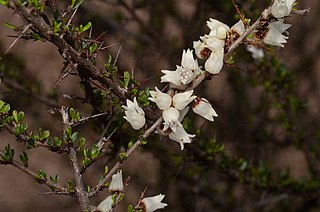
Cryptandra armata is a flowering plant in the family Rhamnaceae and is endemic to Queensland. It is a shrub with spiny branchlets, spatula-shaped to lance-shaped or egg-shaped leaves with the narrower end towards the base, and creamy-white tube-shaped to bell-shaped flowers.
Cryptandra beverleyensis is a species of flowering plant in the family Rhamnaceae and is endemic to the southwest of Western Australia. It is a shrub with narrowly oblong leaves and clusters of white, tube-shaped flowers.
Cryptandra campanulata is a species of flowering plant in the family Rhamnaceae and is endemic to South Australia. It is a shrub with narrowly elliptic to narrowly egg-shaped or linear leaves and clusters of white, bell-shaped flowers.
Cryptandra ciliata is a species of flowering plant in the family Rhamnaceae and is endemic to south-eastern Queensland. It is a shrub with clustered linear leaves and densely-hairy, white, tube-shaped flowers.
Cryptandra congesta is a flowering plant in the family Rhamnaceae and is endemic to a restricted area of the south-west of Western Australia. It is a low, spreading shrub with narrowly egg-shaped or narrowly oblong leaves and clusters of white, tube-shaped flowers.
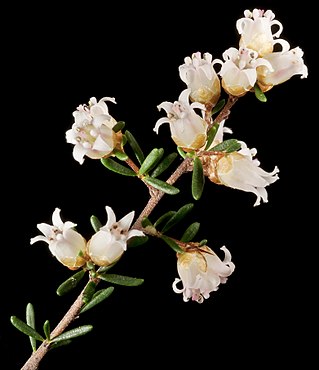
Cryptandra connata is a species of flowering plant in the family Rhamnaceae and is endemic to inland Western Australia. It is an erect, prickly shrub with linear to lance-shaped leaves and clusters of white, pink or purple, tube-shaped flowers.
Cryptandra craigiae is a flowering plant in the family Rhamnaceae and is endemic to a restricted area of southern Western Australia. It is a shrub with linear leaves and dense clusters of white or cream-coloured, tube-shaped flowers.
Cryptandra dielsii is a flowering plant in the family Rhamnaceae and is endemic to the south-west of Western Australia. It is a spreading shrub with linear to narrowly oblong leaves and dense clusters of white, hairy, tube-shaped flowers.
Cryptandra distigma is a flowering plant in the family Rhamnaceae and is endemic to inland Western Australia. It is a shrub with oblong or narrowly egg-shaped leaves and clusters of white to cream-coloured, tube-shaped flowers.
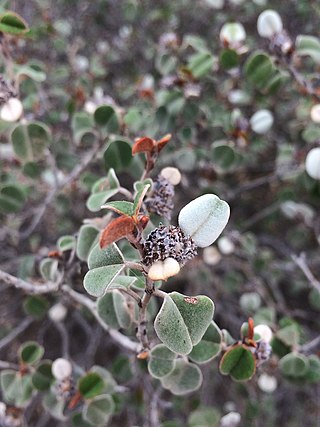
Spyridium tricolor is a species of flowering plant in the family Rhamnaceae and is endemic to southern continental Australia. It is an erect shrub with broadly elliptic to round leaves, and dense clusters of densely woolly-hairy, cream-coloured flowers.
Cryptandra exserta is a flowering plant in the family Rhamnaceae and is endemic to inland Western Australia. It is a shrub with narrowly oblong leaves and clusters of white, tube-shaped flowers.
Cryptandra gemmata is a species of flowering plant in the family Rhamnaceae and is endemic to the far north of the Northern Territory. It is a shrub with clustered linear leaves and white to creamy-white, tube-shaped flowers.
Spyridium villosum is a species of flowering plant in the family Rhamnaceae and is endemic to the south-west of Western Australia. It is a small shrub with shaggy-hairy branchlets, linear to oblong leaves and dense heads of hairy flowers with broad brown bracts at the base.
Cryptandra glabriflora is a flowering plant in the family Rhamnaceae and is endemic to Kalbarri National Park in Western Australia. It is a low shrub with linear or oblong leaves and clusters of white or pink, tube-shaped flowers.
Cryptandra graniticola is a flowering plant in the family Rhamnaceae and is endemic to southern Western Australia. It is an upright, spreading shrub with spiny branchlets, linear to narrowly egg-shaped leaves and clusters of white, tube-shaped flowers.

Cryptandra hispidula, commonly known as rough cryptandra, is a species of flowering plant in the family Rhamnaceae and is endemic to South Australia. It is a small shrub with clustered, cylindrical leaves, and tube-shaped white flowers surrounded by leafy bracts.






